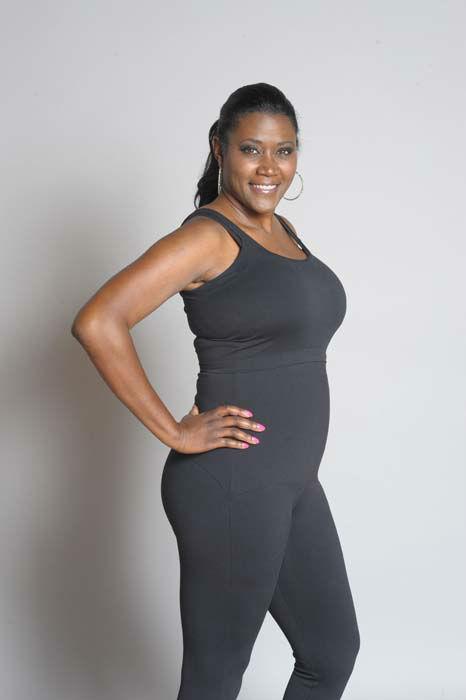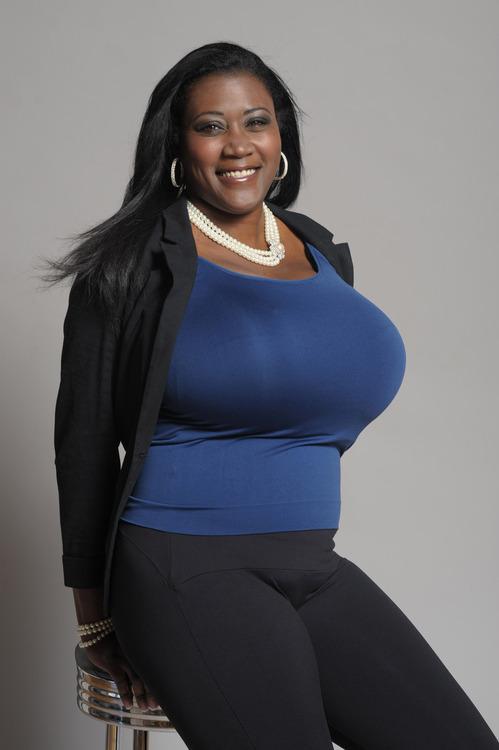
Marks shows off her new look after her breast reduction, a procedure she says improved her quality of life “by 100 percent.” (Debbie Porter Photography)
A few weeks ago, Kerisha Marks
walked a charity 5K in 49 minutes — a personal best that prompted her to
quip on Facebook, “These breasts are made for walking.” In the past,
the same distance would have taken her over an hour and a half to
complete. What changed? She had a breast reduction.
Before the October procedure,
Marks, 40, wore a size 36NNN bra. “I’ve always had really large
breasts,” she told Yahoo Health. “I was an H cup in high school.”
But in 2007, after Marks had a
stillborn baby, her breasts began to grow at an increasingly rapid rate,
until she reached her current size. “I wondered if it was something
medical, but everybody just said it was genetic,” Marks said. “My cousin
had very large breasts. So did my aunt. They opted to have surgery
years ago, but I was not mentally prepared for surgery.”

For seven years, Kerisha Marks struggled to find size 36NNN bras. Now, after surgery, she feels “normal” for the first time. (Debbie Porter Photography)
However, the weight of her
breasts was taking an undeniable toll on her both physically and
emotionally. There were the hurtful — often inappropriate — comments
from strangers, usually men. And, of course, back spasms and migraines
from the pain. Once, when Marks took off her bra, the strain of her
unsupported breasts caused her to pull a muscle. “I thought I was having
a heart attack,” she said.
Not surprisingly, her breasts
restricted her ability to exercise. “There was never a sports bra big
enough to fit me,” Marks recalled. “I had 15 pounds removed — that’s
like an eight-pound baby on one side and seven-pound baby on the other.
That slows you down.”
It was an incident this past
summer that finally prompted Marks to contact Dr. Franklin Rose, a
renowned plastic surgeon in Houston, Texas. She noticed a lump in her
armpit, and afraid that it was cancerous, she scheduled a mammogram. “It
turned out the lump was breast tissue,” Marks said. “The breast tissue
didn’t have anywhere else to go, so it started to go underneath my
armpit.” That’s when she knew it was time to take the leap and schedule a
surgery. “I was turning 40, and I just started to think about regret,”
she said. “I didn’t want to get in my 60s and my breasts be sitting in
my lap, and say, ‘I wish I’d done something when I was younger.’”

Kerisha Marks, before surgery (Courtesy of Dr. Franklin Rose)
Marks had long assumed that she
just had large breasts, but Rose diagnosed her with “gigantomastia,” a
condition that can occur in women or men, in which there is massive
overgrowth of the breasts. “[Marks’s] breasts were literally about the
size of three basketballs,” Rose told Yahoo Health. “I’ve done about
8,000 breast procedures — augmentations, lifts, reductions — and hers
were really the largest breasts I’ve ever come across in clinical
practice in over 30 years.”
The medical community hasn’t
agreed on a threshold at which large breasts cross over to
gigantomastia, which Rose estimates occurs in about 8 percent of women.
Some consider anything beyond an EEE bra size to be gigantomastia. One study
defined the condition by weight: If a woman’s breasts exceed 3 percent
of her body weight, she should be diagnosed with gigantomastia, the
researchers said. “Some plastic surgeons say that if you can anticipate
removing 1,500 grams per breast, which is a little over three pounds,
that’s gigantomastia,” said Dr. Kendall Roehl, a board-certified plastic
surgeon. “Others would say it has to be more than 2,000 grams. So there
is no true way to definitively diagnose it.”
The cause of the condition is
equally unclear, although doctors speculate that both genetics and
hormones play a role. “It’s not really well understood,” said Rose. What
is painfully obvious is the physical harm that the condition can cause.
“Patients get back pain, neck pain,” he said. “[Marks] would have
developed severe spinal curvature, known as kyphosis, which means
‘hunchback.’ She would have literally been stooped at her waist, because
nobody can support all of that extra weight for an extended period of
time.”
Perhaps because the condition is
so ill-defined — and also because breast reduction is sometimes deemed a
cosmetic procedure — health insurance providers often refuse to cover
surgery for women with gigantomastia. In fact, Marks was denied coverage
for a breast reduction in the past, which is why Rose offered to
perform the procedure for free. “The insurance carriers have
ever-changing targets,” Rose said. “When I started practicing, a 350-,
400-gram reduction per breast would be considered medically necessary.”
That number keeps growing, he said.
Several weeks after the surgery,
how does Marks feel? “When I first got home, I did cry. I mourned
them,” she admitted, comparing the loss she felt to a bad divorce or
even a death. “They were with me my entire adult life, so looking in the
mirror and not seeing them was a bit shocking.” But now she knows with
100 percent certainty that she made the right decision. “It’s like my
light was dimmed, and now it’s shining bright, because I feel normal,”
she told Yahoo Health. “I want to go out to Victoria’s Secret, somewhere
I can get a nice, beautiful bra. I’m waiting for that ultimate
moment.”
It is really a nice and helpful piece of info. I’m glad that you simply shared this helpful info with us. Thank you for sharing.!!
ReplyDeleteDr. Michael A. Fiorillo
Superbly written article, if only all bloggers offered the same content as you, the internet would be a far better place.. Reduction Mammoplasty
ReplyDeleteIt took a lot of courage, and a potentially harmful situation to force you to get beast reduction surgery. I am glad you did it, as they would have only gotten bigger and more disfiguring and painful. How kind of Dr. Rose to do the surgery for free! I have one question and that is whether her reduced breasts will resume growing.
ReplyDelete🙌 It’s important to understand the benefits and process of breast reduction surgery. For anyone looking into breast reduction surgery cost delhi consulting with a trusted surgeon can help clarify the options and ensure a safe procedure. 💉💡
ReplyDelete
ReplyDeleteYou must be thinking if you should get breast augmentation and breast lift surgery in delhi together or vice versa. Let's explore some benefits of incorporating both surgeries
Breast Augmentation Delhi: Benefits of Combining the Two Procedures
Improvement in Breast Volume
One of the most notable benefits of combining the procedure ofbreast augmentation surgery in Delhi and breast lift is the improvement these two procedures bring in breast volume. We all know that when women age, their breasts tend to lose their volume and shape. There can be many factors behind it, like